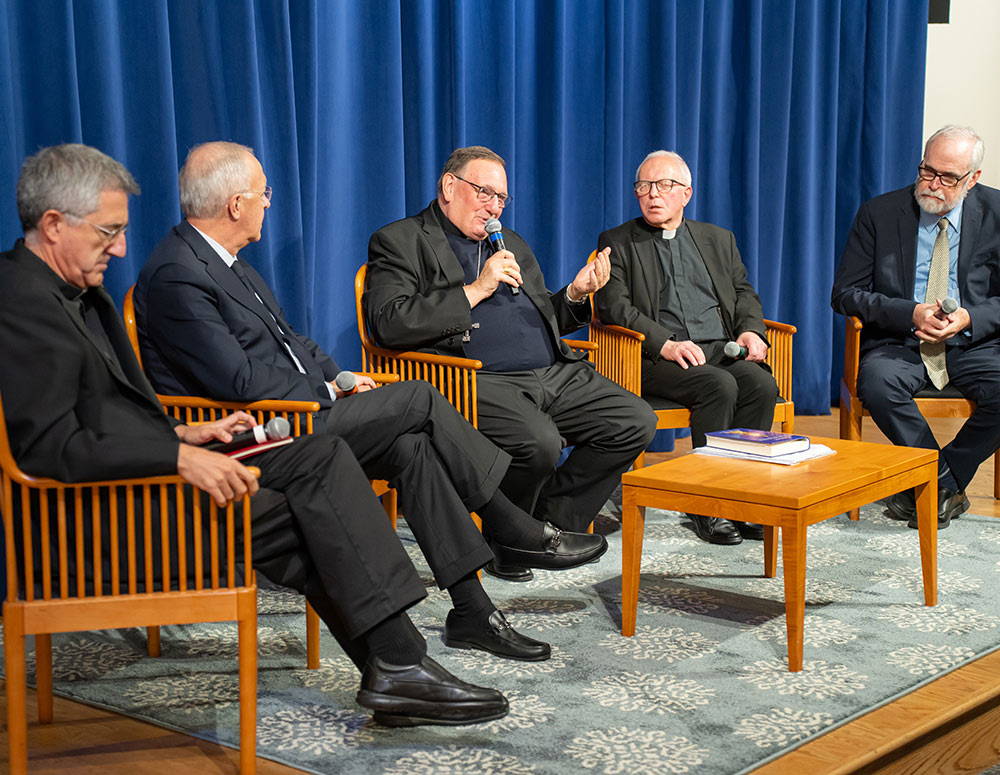St. John Paul II and Human Destiny
Bishop Jean Laffitte probes our identity as children of God in a newly translated book of essays
By Knightline staff
10/12/2024
 Bishop Jean Laffitte (center) answers questions about his book Oct. 9 at the Saint John Paul II National Shrine in Washington. He is joined, from left, by Father José Granados, superior general of the Disciples of the Hearts of Jesus and Mary; Past Supreme Knight Carl Anderson; Father George Woodall, a theologian and priest of the Diocese of Nottingham in England; and David Crawford, dean of the Pontifical John Paul II Institute for Studies on Marriage and Family in Washington. (Photo by Sarah Davis)
Bishop Jean Laffitte (center) answers questions about his book Oct. 9 at the Saint John Paul II National Shrine in Washington. He is joined, from left, by Father José Granados, superior general of the Disciples of the Hearts of Jesus and Mary; Past Supreme Knight Carl Anderson; Father George Woodall, a theologian and priest of the Diocese of Nottingham in England; and David Crawford, dean of the Pontifical John Paul II Institute for Studies on Marriage and Family in Washington. (Photo by Sarah Davis)
French theologian Bishop Jean Laffitte visited the Saint John Paul II National Shrine in Washington, D.C., Oct. 9 to discuss a collection of his essays with Past Supreme Knight Carl Anderson and other scholars, a discussion co-hosted with the Pontifical John Paul II Institute for Studies on Marriage and Family.
Bishop Laffitte, who has previously served as vice president of the Institute’s Rome session, as vice president of the Pontifical Academy of Life, and as secretary for the Pontifical Council of the Family, has written extensively on the philosophy and theology of St. John Paul II. His book Christ, The Destiny of the Human Person — first published in French in 2012 and now translated into English by Father George J. Woodall — looks at pressing moral questions related to marriage, family, abortion, euthanasia and other topics in light of the Second Vatican Council insight that “Christ, the final Adam … fully reveals man to man himself” (Gaudium et Spes, 22).
Pope John Paul II developed this Christ-centered anthropology throughout his pontificate, including in his 1993 encyclical Veritatis Splendor. Bishop Laffitte develops it further in his essays, in which he focuses on man’s filial identity — his destiny as a son of God — as revealed by Christ.
“Human action cannot be understood completely except in the light of the grace of Christ, and beyond that of what God intends for us, the divine intention,” the bishop said in his remarks at the shrine. “On the basis of the teaching of the eternal Son, we have learned to address ourselves to God as ‘Our Father who art in heaven.’ The plan of God is precisely that we recognize and accept him as a father.”
As sons and daughters of God the Father, he continued, we are called to accept his authority and trust him without reserve, and this has implications for our actions.
“Our nature must always be brought back to him who created it: God, our creator and our Father,” Bishop Laffitte said. “A father is not indifferent to the good which is accomplished in each of men and women, the good which makes them become ever more and more his children.”
Numerous questions of Christian ethics today, the bishop concluded, would benefit from the perspective of seeing humanity in light of God’s fatherhood.
Past Supreme Knight Anderson, Father Woodall and Father José Granados, superior general of the Disciples of the Hearts of Jesus and Mary, also offered remarks and afterward participated in a short discussion with Bishop Laffitte led by David Crawford, dean of the Washington session of the John Paul II Institute.
Past Supreme Knight Anderson, founding dean of the Washington session and vice president for more than 30 years, thanked the bishop for his contributions to the theology of St. John Paul II.
“Much has been written in the last 50 years about a new Catholic moral theology, and especially about a new American Catholic moral theology,” Anderson said. “Whether intentionally or not, with publication in English of Christ, The Destiny of the Human Person, Bishop Lafitte has entered that discussion with what will hopefully be a necessary corrective — a moral life in which love and obedience to the will of the Father as revealed by his Son is constitutive of the Christian life and of the Christian ethical decision making.”
The shrine will continue to host numerous special events in the days leading up to the feast of Pope John Paul on Oct. 22, including opportunities to venerate a first-class relic; a special Mass and reception Oct. 16, the anniversary of his election; and the annual St. John Paul II Pilgrimage on Oct. 19.